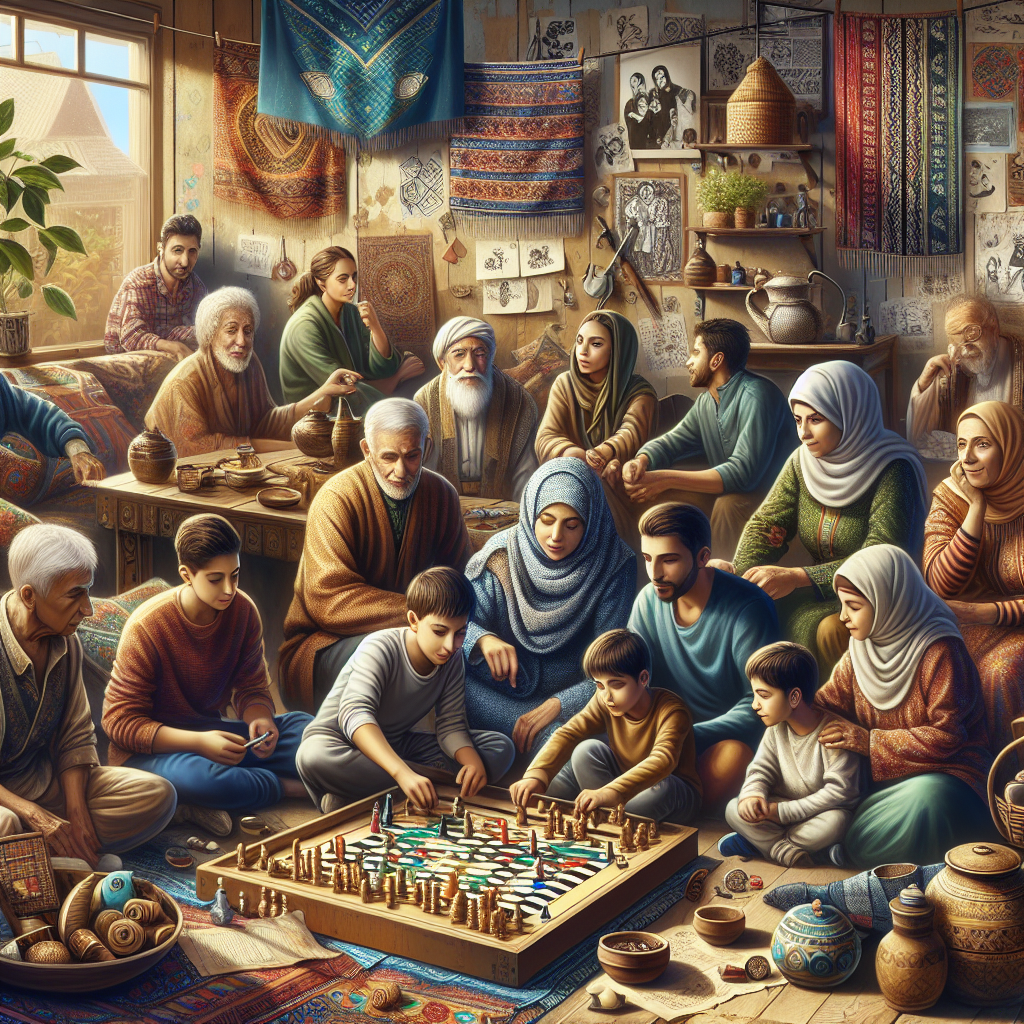Tradition has always been a cornerstone of human existence, shaping the morals, beliefs, and values that communities and families hold dear. In many cultures, tradition plays a pivotal role in how families navigate life, make decisions, and pass down values from generation to generation. The concept of “family karma” intertwines with these traditions, creating a complex web of influence that can shape individual identities and communal bonds. This article delves into the interplay of tradition and family karma, examining how these elements guide values and behaviors within families.
Understanding Family Karma
The idea of family karma is rooted in the belief that the actions and decisions of past generations can influence the present and future of family members. It draws upon the principles of karma in broader spiritual contexts, where thoughts, deeds, and intentions create a cyclical effect on an individual’s life. Within families, this manifested karma can be observed in the emotional and psychological burdens that get passed down—a repository of both positive and negative experiences that shape individual behavior.
Family karma can be understood through various lenses, including the emotional, spiritual, and even physical traits that link family members across time. Traits such as resilience, adaptability, and specific forms of wisdom may be inherited through tradition. Conversely, unresolved issues or past traumas can also seep through family lines, creating patterns of behavior that may be detrimental. Therefore, understanding how tradition informs family karma is essential to grasping how families evolve over time.
The Pillars of Tradition
Tradition encompasses rituals, customs, and belief systems passed through generations. These foundational elements provide a framework for understanding how family dynamics operate. Three primary pillars of tradition can be identified: cultural heritage, religious beliefs, and familial rituals.
Cultural Heritage
Cultural heritage forms a significant part of a family’s identity, shaping the values and norms that govern interactions. This aspect of tradition includes language, cuisine, attire, and societal expectations. For instance, families of Hispanic descent often celebrate traditions such as Día de los Muertos, which emphasizes remembering and honoring deceased family members. Such traditions imbue values of respect, remembrance, and continuity, shaping how current generations relate to their ancestry.
Furthermore, cultural heritage fosters a sense of belonging and identity. When families engage in cultural practices, they link themselves with others who share similar backgrounds, reinforcing ties with their heritage. These shared experiences provide comfort and a roadmap for navigating challenges, promoting resilience and unity among family members.
Religious Beliefs
Religious traditions offer another significant pillar that influences family karma. Many families find strength and guidance in spiritual values that dictate moral behaviors and community involvement. For instance, in Christian families, traditions surrounding holidays like Christmas or Easter often emphasize virtues such as charity, kindness, and love. These values are not just seasonal but become integral to family identity and the principles passed down through generations.
The role of rituals, ceremonies, and religious observances creates a conduit for families to connect across ages. For example, the passing down of values from parents to children during significant life events—baptism, Bar/Bat Mitzvahs, or rites of passage—ensures that spiritual lessons are ingrained within the family unit.
Familial Rituals
Familial rituals are exclusive practices that families engage in, creating unique bonds and shared experiences. These rituals may include annual gatherings, storytelling sessions, or special meals that honor family history. For instance, the practice of sharing stories during family dinners can help children internalize lessons learned by their elders, thereby solidifying values like honesty, hard work, and empathy.
Moreover, these rituals offer opportunities for emotional connection. They foster an environment where members feel valued, heard, and understood. By participating in familial rituals, families reinforce loyalty and a sense of responsibility toward one another, which is crucial in cultivating healthy family karma.
The Intersection of Tradition and Values
Values are the guiding principles that influence behaviors and decisions within families. They are often shaped significantly by tradition, leading to behaviors that resonate with family karma. This intersection can be examined through the lenses of moral education, conflict resolutions, and personal identity.
Moral Education
Much of moral education occurs within the family context, where children learn behavioral norms and ethical standards. Through the lens of tradition, families teach principles of right and wrong that align with their cultural, religious, and familial contexts. For example, many families prioritize gratitude and kindness by modeling these behaviors through daily activities and highlight their importance during traditional celebrations.
The significance of this moral education is that it helps children develop a foundation for their future actions. As they internalize these values, they carry forward the karmic lessons derived from family traditions. This shaping of moral compass not only guides individual choices but also affects the broader lineage of family karma.
Conflict Resolution
As families interact, conflicts inevitably arise. Tradition often guides how family members address disagreements and challenges. For many cultures, honor, respect, and reconciliation are critical components in conflict resolution. This emphasis on traditional frameworks for resolving issues can facilitate an environment of understanding, ensuring that family bonds remain intact despite challenges.
For instance, a family might rely on a traditional process of mediation, where elder members arbitrate disputes according to established norms. By engaging such practices, families can demonstrate the importance of communication, forgiveness, and support, which significantly contribute to their collective family karma.
Personal Identity
The influence of tradition on personal identity is profound. Children are often shaped by their family’s values, molding their perspectives and character traits. In contexts where tradition is a strong component, individuals often find a sense of pride in their identity, understanding their place within the lineage and the responsibilities that accompany it.
However, the interplay between personal identity and tradition can be complex. In multicultural societies, for example, younger generations may grapple with the tensions of cultural duality or even rejection of their inherited traditions in favor of broader societal norms. These dynamics can also affect family karma, as differing individual choices may lead to rifts or reconciliations within family structures.
The Impact of Tradition on Family Karma
The ramifications of tradition on family karma are multifaceted. Positive traditions that emphasize values such as love, loyalty, respect, and mutual support can create a legacy of resilience and strength. In contrast, negative behaviors, if left unchallenged, can lead to generational cycles of conflict and emotional distress.
Positive Impacts
Positive traditions cultivate harmony and facilitate the transmission of valuable lessons and behaviors. Families that engage in acts of kindness, charity, and altruism establish strong moral foundations for younger members. Such behaviors create a culture of empathy and understanding, fostering an environment where family members support one another and work collaboratively to overcome challenges.
Moreover, families that prioritize celebrations of heritage create connections with the past that instill pride and appreciation. These values help future generations navigate life with confidence, knowing they have the collective strength of their lineage behind them.
Negative Impacts
Conversely, families that perpetuate negative traditions—such as secrecy, unresolved grievances, or communal silence around issues—can inadvertently create toxic dynamics. Unaddressed conflicts can fester, leading to estrangement across generations. These families often find themselves caught in cyclical patterns that perpetuate negativity, creating barriers to open communication and healing.
This “karmic debt,” if not acknowledged and addressed, can manifest as emotional burdens within family members, as they grapple with the consequences of negative legacies. Individuals may find themselves repeating problematic behaviors extracted from familial histories, necessitating conscious efforts to break free from these cycles.
Breaking Cycles: The Responsibility of Tradition
Understanding the dual nature of tradition prompts the question of responsibility. While traditions can provide a foundation for family values, it is essential for contemporary families to evaluate them critically. Recognizing outdated or harmful traditions is vital to breaking negative cycles and crafting new paths forward.
Reflecting on Traditions
Families must engage in reflective practices that assess the value of their traditions. This involves openly discussing past customs, acknowledging their impacts on family karma, and determining their relevance in a modern context. Engaging in intergenerational dialogue can aid this process, as it allows family members to share their perspectives and experiences.
Moreover, families can host traditions that foster openness and healing, encouraging members to express their feelings concerning family karma and introspectively examine how this influences their identities.
Creating New Traditions
As families move forward, it is crucial to create traditions that resonate with current values and societal contexts. This may involve adapting old customs or establishing new practices that promote inclusivity, understanding, and emotional support. By doing so, families lay the groundwork for a more positive family karma, ensuring that future generations benefit from a legacy of healthy values.
Accountability and Healing
Finally, accountability plays a central role in navigating the intersection of tradition and family karma. Families should take ownership of the traditions they uphold, recognizing their significance while remaining open to change. This may involve acknowledging the negative consequences of particular customs and actively working to shift narratives towards healing and growth.
Conclusion
Tradition serves as a powerful lens through which family karma is understood and experienced. It lays the groundwork for the values that guide individuals within families, influencing behavior, identity, and emotional bonds. Importantly, while tradition can foster positive values and resilience, it can also perpetuate negativity if reflective practices and openness are neglected.
For families navigating the complexities of modern life, it is vital to engage with traditions critically—understanding their historical influences while being willing to adapt them for contemporary contexts. By embracing accountability and fostering healing, families can create legacies that not only honor their heritage but also promote growth and connection across generations. Ultimately, the role of tradition in family karma highlights the delicate balance between honoring the past and creating a brighter future.
FAQs
What is family karma?
Family karma refers to the idea that the actions and behaviors of past generations influence the present and future of family members. It encompasses both positive and negative legacies passed down through familial lines.
How does tradition influence family values?
Tradition shapes family values through cultural practices, religious beliefs, and familial rituals that instill norms and behaviors that govern interactions within the family unit.
Can negative family traditions be changed?
Yes, negative family traditions can be changed. Families can engage in reflective practices, discuss the impacts of these traditions, and create new values and customs that promote healing and growth.
Why are family rituals important?
Family rituals are essential as they foster emotional bonding, create a sense of belonging, help transmit values, and provide opportunities for shared experiences that strengthen relationships.
How can families promote positive family karma?
Families can promote positive family karma by fostering open communication, establishing supportive traditions, practicing accountability, and prioritizing healing from past grievances.
It seems like your message was cut off. Could you please provide more details or clarify what prompt you’re referring to? I’ll be happy to help!, #Role #Tradition #Family #Karma #Reflection #Values, #Role #Tradition #Family #Karma #Reflection #Values, 1736173597, the-role-of-tradition-in-family-karma-a-reflection-on-values





